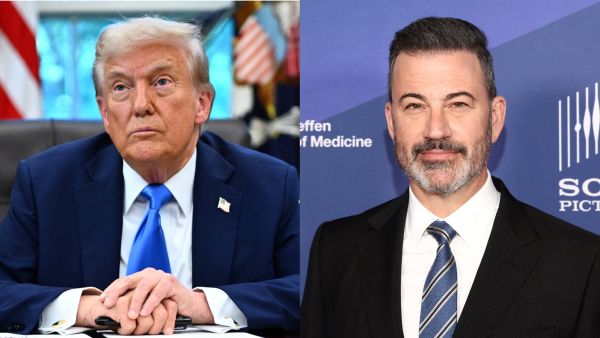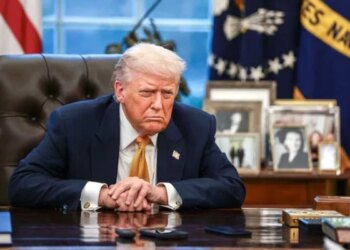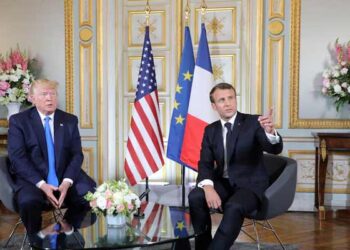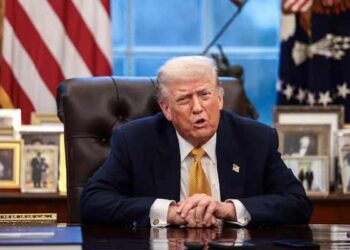Select Language:
Digital Phablet – Trump Provokes Outrage by Threatening TV Licenses Amid Jimmy Kimmel Firing Controversy
Also Read
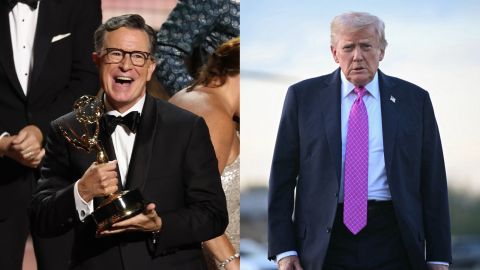
Stephen Colbert satirizes Trump following ‘Late Show’s first Emmy win
U.S. President Donald Trump has suggested that certain television networks should have their licenses revoked.
The remarks follow governmental pressure on ABC to dismiss Jimmy Kimmel. The late-night host discussed the suspect involved in Charlie Kirk’s murder, asserting that Trump’s supporters had attempted to depict the individual in any way other than reflecting their own — implying an attempt at political manipulation.
Other talk show hosts have raised concerns about this controversy following Kimmel’s suspension due to fears of regulatory repercussions. This has sparked worries that the Trump administration is attempting to suppress dissenting voices through censorship.
Stephen Colbert, on his rival CBS program, condemned what he called “blatant censorship,” emphasizing, “You can’t give an inch with an autocrat.”
The “MAGA gang”—supporters rallying behind Trump’s “Make America Great Again” slogan—were discussed in Kimmel’s monologue, where he described their attempts to reframe the narrative around Kirk’s murder, alleging they sought to “score political points.”
According to Utah police, Kirk had been “indoctrinated with leftist ideology” before his death.
Kimmel also criticized Trump’s response to the tragedy, likening it to “how a four-year-old mourns a goldfish,” after initially expressing condolences to Kirk’s family.
Following the incident, Kimmel condemned the attack and offered his support to the Kirk family.
Trump addressed the issue publicly on Thursday, during a flight back from a UK visit aboard Air Force One, stating, “I’ve read that the networks were 97% against me — and yet I won the last election comfortably.” He added, “They only spread bad news about me. They’re trying to revoke their licenses, and I believe that should happen.”
FCC Chairman Brendan Carr criticized Kimmel’s actions as “the sickest way possible,” asserting that companies like Disney’s ABC could “find ways to modify their conduct or face consequences,” hinting that regulatory action might follow. Carr declared, “We will continue to hold broadcasters accountable to the public interest, and if they oppose our efforts, they can simply surrender their licenses.”
The FCC’s responsibility extends to overseeing both major networks like ABC and smaller stations, with local owners potentially influencing programming choices by refusing to air certain shows.
Shortly after Nexstar Media, a leading station owner, announced it would not broadcast Kimmel’s show “for the foreseeable future” due to his “offensive and insensitive” comments, the program was temporarily suspended.
As Nexstar seeks FCC approval to partner with Tegna for a $6.2 billion deal, Carr praised the move and expressed hope that other broadcasters would follow suit.
Sinclair, the largest ABC affiliate group in the country, announced it would honor Kirk with a special broadcast during the Jimmy Kimmel Live! time slot.
Kirk was shot during a speech at Utah Valley University on September 10 and died. A 22-year-old suspect has been charged with his murder, with authorities claiming the individual had been “indoctrinated with leftist ideology” and faces the death penalty.
Legal experts argue that the First Amendment protects free speech and would prevent the FCC from revoking licenses based solely on political disagreements.
Joe Strazullo, a former writer for Jimmy Kimmel Live!, told the BBC that the writers’ room was overwhelmed with fear.
“It’s heartbreaking to see the risk of losing jobs,” he said, noting ongoing efforts behind the scenes to resolve the situation.
Many prominent Democrats, actors, and writers have voiced opposition to Kimmel’s suspension.
Former President Barack Obama criticized the Trump administration for advancing a “new and dangerous level” of cancel culture, warning against threatening regulatory measures at media outlets for dissenting views.
Late-night hosts have expressed support for Kimmel, with The Daily Show featuring a rare midweek episode dedicated to jokes on how the current administration limits free speech.
Jon Stewart, calling himself a “patriotically obedient host,” joked that he was simply adhering to government rules, and sarcastically referred to Trump as “dear leader,” mocking his visits to England.
Later, Stewart interviewed Maria Ressa, who was awarded the Nobel Peace Prize in 2021 for defending free speech in the Philippines under Duterte’s regime. Ressa remarked that US developments echo her country’s experience, describing it as “deja vu and PTSD,” and warned Americans are “like deer caught in headlights” — emphasizing the difficulty of restoring lost rights.
Actor Ben Stiller criticized the suspension, calling it “unfair,” while Jean Smart, star of Hacks, expressed her horror at what she called “the cancellation.”
The Writers Guild of America and the Screen Actors Guild issued statements condemning Kimmel’s ban, considering it an attack on constitutional free speech rights.
Some, however, argue that immediate consequences for offensive or stupid remarks are justified. Dave Portnoy, founder of Barstool Sports, said, “That’s not cancel culture — that’s the result of your own actions.”
Fox News host Greg Gutfeld accused Kimmel of “deliberately and misleadingly” blaming Kirk’s death on supposed “allies and friends,” sparking outrage across America.
British host Piers Morgan questioned why Kimmel is celebrated as a free speech martyr, asking, “Why is he being hailed as some kind of hero?”
Democratic FCC commissioner Anna Gomez opposed the agency’s stance, emphasizing that “an act of political violence by a disturbed individual should never be exploited as a justification for censorship or control.”
While opinions remain divided, the debate continues over the balance between free speech, accountability, and regulation in American media.

